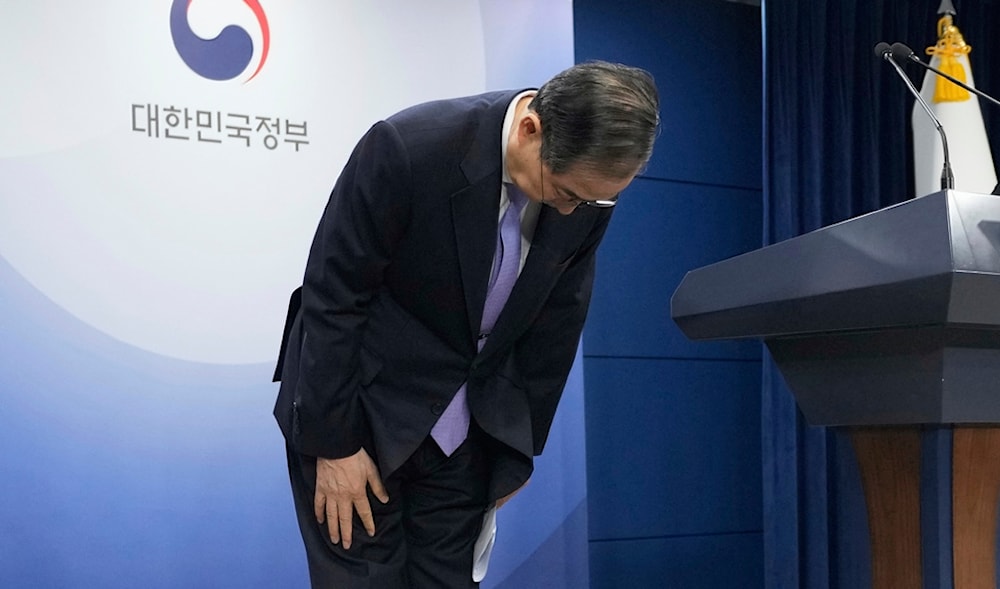South Korean court reinstates impeached PM as acting president
Han Duck-soo was impeached and suspended on December 27 after clashing with the opposition-led parliament over his refusal to appoint three additional justices to the Constitutional Court.
-
 South Korean acting President Han Duck-soo bows during a briefing at the Government Complex in Seoul, South Korea, Monday, March 24, 2025. (AP)
South Korean acting President Han Duck-soo bows during a briefing at the Government Complex in Seoul, South Korea, Monday, March 24, 2025. (AP)
South Korea's Constitutional Court reinstated Prime Minister Han Duck-soo as acting president on Monday, overturning his impeachment.
The ruling, issued amid months of political unrest, immediately restored Han to power. He had taken over as acting leader following the impeachment of President Yoon Suk Yeol, who was removed after briefly imposing martial law in December.
"I believe the people are making it very clear, in one voice, that the extreme confrontation in politics must stop," Han said, thanking the court for its "wise decision" and acknowledging the cabinet’s efforts during his suspension.
"As acting president, I will do my best to maintain stable state administration, and devote all wisdom and capabilities to safeguard national interests in the trade war," Han said in a televised statement.
South Korea, a major global exporter, has been bracing for the potential fallout from a series of tariffs threatened by US President Donald Trump. US tariffs have already hit the country on steel and aluminum and is seeking an exemption from additional duties set to take effect next month.
Yoon’s declaration of martial law triggered South Korea’s worst political crisis in decades, creating a leadership vacuum as top officials faced impeachment, resignations, and criminal investigations.
Han, initially serving for less than two weeks, was impeached and suspended on December 27 after clashing with the opposition-led parliament over his refusal to appoint three additional justices to the Constitutional Court.
On Monday, the court ruled 7-1 in favor of nullifying Han’s impeachment. Five of the eight justices acknowledged the validity of the impeachment motion but found no constitutional or legal violations sufficient to remove Han from office, according to the court’s statement.
Two justices further argued that the impeachment was invalid from the outset, as it failed to secure the required two-thirds majority in parliament.
Fears of civil war loom over South Korea
Han, 75, has held leadership roles under five presidents from both conservative and liberal backgrounds, making him a rare figure in South Korea’s deeply polarized political landscape.
Despite this, opposition lawmakers accused him of failing to prevent Yoon’s martial law declaration—an allegation he denied.
Lee Jae-myung, leader of the opposition Democratic Party, said Han’s reinstatement must be accepted but urged the court to expedite its ruling on Yoon’s impeachment.
The Constitutional Court is expected to issue a decision within days, though the process has taken longer than anticipated. Yoon also faces a separate criminal trial for allegedly leading an insurrection by imposing martial law.
A new presidential election must be held within 60 days if Yoon is removed from office.
"The court's continued delay in ruling is fueling concern and conflict ... We can now anticipate the situation going beyond a psychological civil war to become an actual physical civil war," said Lee, who leads in polls as a potential successor if Yoon is ousted.
Earlier in March, Yoon was released from detention under technical and legal grounds but remains under investigation over his declaration of martial law.
A court canceled Yoon's arrest warrant on procedural grounds, a verdict that was called "unjust" by prosecutors who were investigating the impeached president after they waived the right to appeal the court's decision.
Read more: South Korean president indicted as 'ringleader of an insurrection'

 4 Min Read
4 Min Read








